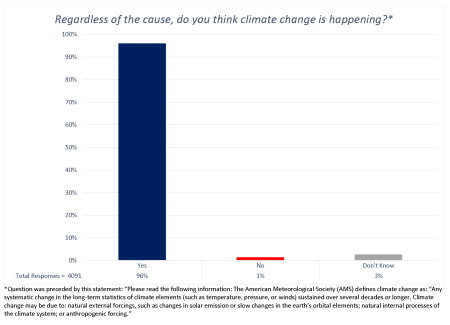97% of the “science” of AGW is rhetoric. Most climate-related scientists generally agree about the 3%. I’m fairly certain that Pat Michaels, David Legates and Wille Soon would agree that CO2 is a greenhouse gas and that, all other factors held equal, adding more of it to the atmosphere will raise the bulk temperature to some degree. Almost all of the “science” beyond that ranges from speculative to purely rhetorical.
Rhetoric…

The scientific “consensus” according to:
Maibach, E., Perkins, D., Francis, Z., Myers, T., Englbom, A., et al. (2016). A 2016 National
Survey of American Meteorological Society Member Views on Climate Change: Initial Findings. George Mason University, Fairfax, VA: Center for Climate Change Communication.
“Climate change is real”

96% of “scientists” agree that climate change is real.
“Man-made”

67% of “scientists” characterized climate change as real and at least >51% man-made.
“And dangerous”

Only 38% of “scientists” characterized climate change as having been dangerous (primarily or exclusively harmful impacts) over the past 50 years.

Only 50% of “scientists” characterized climate change as being dangerous (primarily or exclusively harmful impacts) over the next 50 years.
“And today, there’s no greater threat to our planet than climate change.”
So climate change can no longer be denied – or ignored. The world is looking to the United States – to us – to lead.
–Thankfully former President Barack Hussein Obama, April 18, 2015

Only 18% of “scientists” thought that there was any point in destroying our economy in order to prevent the weather from changing. Fully 41% of “scientists” indicated that climate change might as well be “ignored.”

Climate Change…

Additionally, Stenhouse et al., 2017 tells us that there is conflict within the American Meteorological Society on the subject of climate change.
This article analyzes open-ended survey responses to understand how members of the American Meteorological Society (AMS) perceive conflict within the AMS over global warming. Of all survey respondents, 53% agreed that there was conflict within the AMS; of these individuals who perceived conflict, 62% saw it as having at least some productive aspects, and 53% saw at least some unproductive aspects. Among members who saw a productive side to the conflict, most agreed as to why it was productive: debate and diverse perspectives enhance science. However, among members who saw an unproductive side, there was considerable disagreement as to why. Members who are convinced of largely human-caused climate change expressed that debate over global warming sends an unclear message to the public. Conversely, members who are unconvinced of human-caused climate change often felt that their peers were closed-minded and suppressing unpopular views. These two groups converged, however, on one point: politics was seen as an overwhelmingly negative influence on the debate. This suggests that scientific organizations faced with similar conflict should understand that there may be a contradiction between legitimizing all members’ views and sending a clear message to the public about the weight of the evidence. The findings also reinforce the conclusion that attempts by scientific societies to directly address differences in political views may be met with strong resistance by many scientists.
“Of all survey respondents, 53% agreed that there was conflict within the AMS; of these individuals who perceived conflict, 62% saw it as having at least some productive aspects”…
If it looks like a debate, walks like a debate and quacks like a debate, it might just be a debate.
Leave a comment